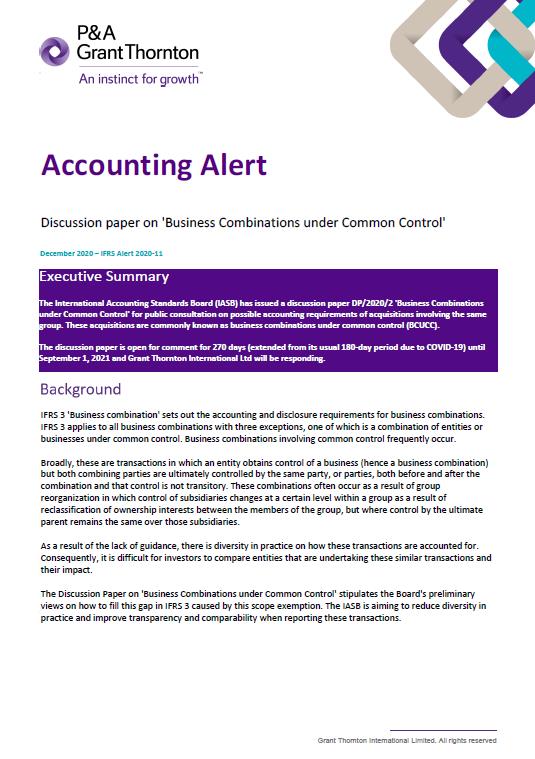This Accounting Alert is issued to circulate the discussion paper by the International Accounting Standards Board (IASB) on 'Business Combination under Common Control' for public consultation on possible accounting requirements of acquisitions involving the same group. These acquisitions are commonly known as business combination under common control (BCUCC).
Background
IFRS 3 ‘Business combinations’ sets out the accounting and disclosure requirements for business combinations. IFRS 3 applies to all business combinations with three exceptions, one of which is a combination of entities or businesses under common control. Business combinations involving common control frequently occur.
Broadly, these are transactions in which an entity obtains control of a business (hence a business combination) but both combining parties are ultimately controlled by the same party, or parties, both before and after the combination and that control is not transitory. These combinations often occur as a result of a group reorganization in which control of subsidiaries changes at a certain level within a group as a result of reclassification of ownership interests between the members of the group, but where control by the ultimate parent remains the same over those subsidiaries.
As a result of the lack of guidance, there is diversity in practice on how these transactions are accounted for. Consequently, it is difficult for investors to compare entities that are undertaking these similar transactions and their impact.
The IASB's Preliminary Views
The IASB is suggesting two approaches. Firstly, if the BCUCC (Business Combination Under Common Control) impacts shareholders outside the group, the assets acquired and liabilities assumed should be recorded at their fair values (i.e., using the ‘acquisition method’). This is consistent with the approach already required in IFRS 3 for regular business combination accounting. Secondly, if the BCUCC does not impact any shareholders outside the group ( i.e., BCUCC in any other situation) then the assets and liabilities will be recorded at their book values ( i.e., the 'book value method').
The IASB is further suggesting that the acquisition method should be applied as it currently stands in IFRS 3. This means deducting the assets and liabilities at fair value from the consideration received and recognizing the difference as goodwill. The book value method would be a single method to be applied that will be specified in the standards (currently there are a variety of book value methods being used).
Consultations
The IASB is seeking feedback on the following:
- The suggested methods and how they would be selected
- The application of each of the methods, and
- Disclosures required for these transactions.
The discussion paper is open for comment for 270 days (extended from its usual 180-day period due to COVID-19) until September 1, 2021 and Grant Thornton International Ltd will be responding.
See attached Accounting Alert for further details.

